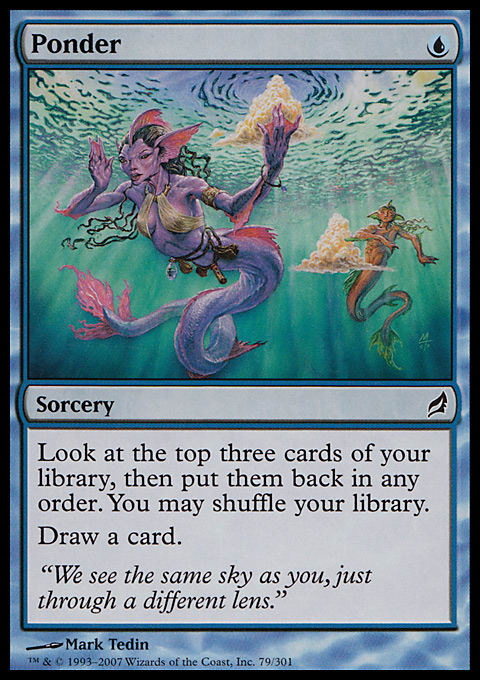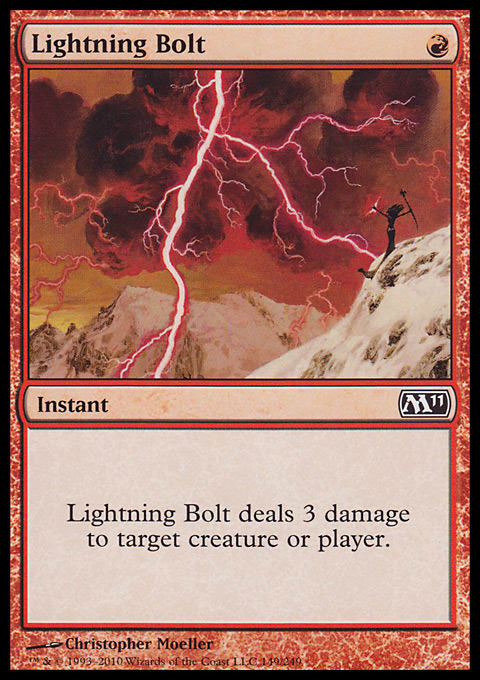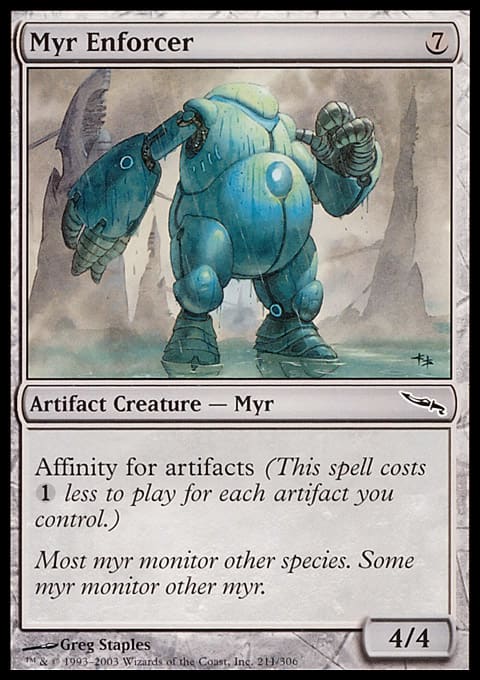Pauper has a lot going for it these days. The Challenges have provided additional insight into the metagame, and with two Masters sets on the horizon, the format is sure to get some new cards in the not too distant future. But that doesn’t change the fact that the player pool is relatively shallow.
The Pauper community, as compared to others, is small. Take a trip to /r/Pauper once a week and you are likely to see the same thread from a different poster repeated over and over. It is an echo chamber and it is a struggle to have new ideas penetrate the bubble. It’s a greater task to have a fresh voice come in and offer their perspective. Part of this is because Pauper is largely played online, behind the veil of anonymity. Players are players and not people (speaking exclusively about Magic Online) with few exceptions.
So, when a known writer starts talking about the format, I take notice. Some time back, Hall of Famer Eric Froehlich started talking about Pauper in his Daily Deck series on ChannelFireball. I was interested since many of the early comments requested Eric cover the format, but he resisted. It was only after Standard became stale that Pauper decks began to appear with regularity, but then the floodgates opened. For me it was fun to watch someone of far greater skill discover the format for the first time.
A few weeks before Pro Tour Hour of Devastation , I reached out to Eric on Twitter to see if he’d answer some questions. Thankfully he agreed and I sent him my inquiries. After Grand Prix Denver, I got my answers and Eric’s professional insights into Pauper. And baseball.
Alex: When you started your Daily Decks, you got a lot of requests for Pauper but waited until a lull in Standard to post decks. Once you did, what surprised you about Pauper (as a format)?
Eric: When I started the column, the intention was to mainly focus on Standard decks. Now, if you’re going to write 300 or more articles per year, that’s not always going to be possible. When Standard became a really redundant format that almost everybody, myself included, became disinterested in, I had to find ways to branch out and make sure there was still some interesting content.
The reason I waited so long to write about Pauper is because I was so inexperienced with it. I had played very little and watched very little, so I knew little about that format while I felt like I could take on the “expert” role with formats like Standard, Modern, and even Legacy and Vintage.
As someone without a history in Pauper, recognizing just how many powerful commons have been printed throughout Magic’s history was pretty incredible. It’s not something I’ve ever had to focus on in the past as the rarity of cards make no impact on what you choose to play on the Pro Tour, but getting to see favorites like Lightning Bolt, Counterspell, and Ponder being prominent in the format is exciting. Cards that are too good for Modern and are restricted in Vintage are staples to the format, so the power level is anything but “pauper”.
Alex: As someone who focuses on other formats (with good reason), are there any tips or tricks you can give on deck construction that Pauper decks seem to be missing?
Eric: The decks in Pauper follow the same principles as decks in Pro Tour formats. Looking for high synergy at the expense of power can work, and just jamming raw power can also work. If you choose to not play powerful cards like Brainstorm or Lightning Bolt, you need to have good reasons to do so, and getting too cute with combos are likely going to fall apart to streamlined dedicated decks.
Alex: What is your personal favorite deck you've featured from Pauper?
Eric: Any deck that can play Delver of Secrets, Brainstorm, Ponder, Preordain, Lightning Bolt, and Counterspell is going to be tough to beat. I love beta cards and any opportunity to play Bolt and Counterspell are ones I try to take advantage of. The ![]()
![]() deck has excellent tempo and an incredibly powerful card base that’s hard for me to ignore. The fact that these decks can’t even fit all the Brainstorms, Ponders, and Preordains into the deck goes to show the raw power.
deck has excellent tempo and an incredibly powerful card base that’s hard for me to ignore. The fact that these decks can’t even fit all the Brainstorms, Ponders, and Preordains into the deck goes to show the raw power.
The first deck I saw in Pauper that really caught my eye with the Urza’s deck with Mnemonic Walls. Was awesome to see so much synergy and power in a deck filled with commons for the first time that being introduced to the format with that strategy was eye opening.
Alex: What card are you surprised sees play? Any you are surprised at not seeing play?
Eric: I don’t think there’s any card I’m “surprised” to see due to power level, but I think it’s crazy to see what the artifact lands do to the format. Affinity cards are so incredible, but the banning of artifact lands have basically restricted people from playing them. Pauper gets to play cards like Frogmite, Myr Enforcer, and even Gearseeker Serpent, which is pretty crazy.
In the same respect, I’m not really surprised by any card not seeing play. For someone who plays a lot of competitive Magic, the first instinct would be for the top commons in most draft formats to be among the most played cards in a Pauper format, but that’s not realistically going to be the case since the best common cards in Limited tend to be pretty mediocre removal spells. In Hour of Devastation draft, the top commons are between Open Fire and cards like Ambuscade or Unquenchable Thirst. Open Fire is widely considered the best, and literal Lightning Bolt is legal!
Alex: What, if anything, would you like to see in the format moving forward? How can you see Pauper growing?
Eric: I’m still just a “casual fan” of the Pauper format, so I’m pretty far removed from knowing what would actually make the format better. As someone who is in the trenches for formats like Competitive Modern and hearing casual fans across the world explain the changes to “improve” the format that I’m confident would make things far worse, I definitely do not feel like I’m in a position to do that with Pauper. It looks like the Pauper Challenges and daily results on MTGO have a nice amount of diversity, but that things are very much slanted toward aggressive strategies. Mono-Green, ![]()
![]() ,
, ![]()
![]() , and Affinity strategies look to be near the top consistently, and while it’s good that there are many decks, it would also be cool if there were better sweepers or ways to punish going wide at common.
, and Affinity strategies look to be near the top consistently, and while it’s good that there are many decks, it would also be cool if there were better sweepers or ways to punish going wide at common.
It’s going to be hard for Pauper to grow dramatically. Having something like Super Leagues or anything involving WotC support would do an incredibly service to the format, but I’m not sure that’s a realistic possibility. Going full “WotC shill” here, it’s just not a format I’ve ever known them to want to promote as commons aren’t what sell packs or promote the game’s growth as a whole like other formats do. If something happens to change that, then things could certainly take off, but beware that formats becoming competitive also lead to things like more bannings and often upset much of the casual player base (see Modern).
This ended the Magic portion of the interview and I want to thank Eric again for his thoughts and time. I think he provided some valuable nuggets of wisdom succinctly, especially with regards about pursuing raw power or synergy in deck construction and his take on the long term view of Pauper. It’s clear from his answers that Eric is a fan of the powerful side of things — Izzet Delver or Dinrova Tron anyone? — and I’m pleasantly surprised to see someone of his caliber want a good sweeper as well.
Of course Eric and I share something else: a love for the New York Mets. Considering this season (it’s not going well folks), I still wanted to pick his brain on a source of mutual misery.
Alex: Who is your favorite current member of the New York Mets? How about all time?
Eric: As a kid growing up in Virginia and a diehard Mets fan, it’s pretty tough to not love David Wright and everything he has done for the franchise. I definitely don’t have any definitive favorites, as I have jerseys of Piazza, Johan Santana, Reyes, Beltran, Wright, and the entire current starting rotation before trips to the Disabled List in Harvey, DeGrom, Syndergaard, and Matz.
For what it’s worth, I have a soft spot for Robin Ventura thanks to the weirdness that was his walk-off Grand Slam single.
So there you have it — a professional player’s take on Pauper. I want to thank Eric again and throw it back to you. What pros would you want to hear from? Where do you stand on power and synergy?

























